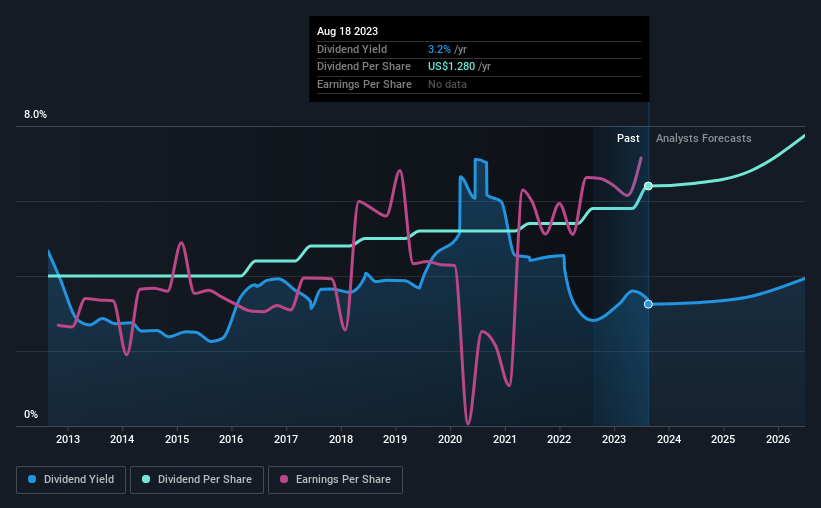- United States
- /
- Consumer Services
- /
- NYSE:HRB
H&R Block's (NYSE:HRB) Upcoming Dividend Will Be Larger Than Last Year's

H&R Block, Inc. (NYSE:HRB) will increase its dividend from last year's comparable payment on the 4th of October to $0.32. This takes the dividend yield to 3.2%, which shareholders will be pleased with.
While the dividend yield is important for income investors, it is also important to consider any large share price moves, as this will generally outweigh any gains from distributions. Investors will be pleased to see that H&R Block's stock price has increased by 33% in the last 3 months, which is good for shareholders and can also explain a decrease in the dividend yield.
See our latest analysis for H&R Block
H&R Block's Earnings Easily Cover The Distributions
While it is great to have a strong dividend yield, we should also consider whether the payment is sustainable. Prior to this announcement, H&R Block's dividend was comfortably covered by both cash flow and earnings. This indicates that quite a large proportion of earnings is being invested back into the business.
Looking forward, earnings per share is forecast to rise by 31.0% over the next year. If the dividend continues along recent trends, we estimate the payout ratio will be 25%, which is in the range that makes us comfortable with the sustainability of the dividend.

H&R Block Has A Solid Track Record
The company has a sustained record of paying dividends with very little fluctuation. Since 2013, the dividend has gone from $0.80 total annually to $1.28. This works out to be a compound annual growth rate (CAGR) of approximately 4.8% a year over that time. Although we can't deny that the dividend has been remarkably stable in the past, the growth has been pretty muted.
The Dividend Has Growth Potential
Some investors will be chomping at the bit to buy some of the company's stock based on its dividend history. H&R Block has seen EPS rising for the last five years, at 5.7% per annum. Since earnings per share is growing at an acceptable rate, and the payout policy is balanced, we think the company is positioning itself well to grow earnings and dividends in the future.
We Really Like H&R Block's Dividend
In summary, it is always positive to see the dividend being increased, and we are particularly pleased with its overall sustainability. The company is easily earning enough to cover its dividend payments and it is great to see that these earnings are being translated into cash flow. All in all, this checks a lot of the boxes we look for when choosing an income stock.
Companies possessing a stable dividend policy will likely enjoy greater investor interest than those suffering from a more inconsistent approach. At the same time, there are other factors our readers should be conscious of before pouring capital into a stock. For instance, we've picked out 1 warning sign for H&R Block that investors should take into consideration. If you are a dividend investor, you might also want to look at our curated list of high yield dividend stocks.
Valuation is complex, but we're here to simplify it.
Discover if H&R Block might be undervalued or overvalued with our detailed analysis, featuring fair value estimates, potential risks, dividends, insider trades, and its financial condition.
Access Free AnalysisHave feedback on this article? Concerned about the content? Get in touch with us directly. Alternatively, email editorial-team (at) simplywallst.com.
This article by Simply Wall St is general in nature. We provide commentary based on historical data and analyst forecasts only using an unbiased methodology and our articles are not intended to be financial advice. It does not constitute a recommendation to buy or sell any stock, and does not take account of your objectives, or your financial situation. We aim to bring you long-term focused analysis driven by fundamental data. Note that our analysis may not factor in the latest price-sensitive company announcements or qualitative material. Simply Wall St has no position in any stocks mentioned.
About NYSE:HRB
H&R Block
Through its subsidiaries, engages in the provision of assisted and do-it-yourself (DIY) tax return preparation services to the general-public primarily in the United States, Canada, and Australia.
Undervalued established dividend payer.

